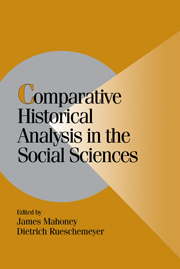1 - COMPARATIVE HISTORICAL ANALYSIS
ACHIEVEMENTS AND AGENDAS
Published online by Cambridge University Press: 05 June 2014
Summary
Comparative historical analysis has a long and distinguished history in the social sciences. Those whom we now regard as the founders of modern social science, from Adam Smith to Alexis de Tocqueville to Karl Marx, all pursued comparative historical analysis as a central mode of investigation. In doing so, they continued a tradition of research that had dominated social thought for centuries. Even when social science began to organize itself into separate disciplines in the early twentieth century, comparative and historical investigation maintained a leading position, figuring prominently in the research of such eminent scholars as Otto Hintze, Max Weber, and Marc Bloch. Only by the mid-twentieth century did other approaches to social knowledge partially eclipse comparative historical research, going so far as to threaten its permanent decline. After some period of neglect, however, recent decades have witnessed a dramatic reemergence of the comparative historical tradition. Although important problems of analytic procedure and methodology remain, this mode of investigation has reasserted itself at the center of today's social sciences.
The revival of comparative historical analysis shows few signs of losing momentum. In the last decade alone, dozens of major new books from this perspective have been published, including many prize-winning analyses. These works focus on a wide range of topics, but they are united by a commitment to offering historically grounded explanations of large-scale and substantively important outcomes.
- Type
- Chapter
- Information
- Publisher: Cambridge University PressPrint publication year: 2003
References
- 96
- Cited by

